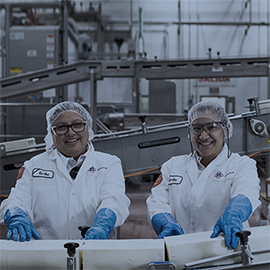Market Trends Shaping the Dairy Industry

To effectively meet the evolving needs of the market and continue innovating in the dairy sector, it is essential to stay attuned to the latest trends and innovations shaping the industry. These developments are redefining our sector and significantly guiding our strategic actions.
Fluid Milk
While fluid milk has grown over 1% in the past year, stronger momentum is emerging in the value-added products segment. This category continues to stand out with a notable 7% increase, driven primarily by the performance of lactose-free and protein-enriched milks.
This shift in preferences reflects a gradual, yet significant change in consumption habits. Consumers are increasingly seeking products that meet specific health, nutrition, or lifestyle needs. This trend is gradually but steadily contributing to an erosion in demand for regular fluid milk, which has had sales decline by 0.5% over the same period.
Local Purchasing
In the current economic climate, 74% of Canadians report having increased their purchases of Canadian-made products in recent weeks.
Dairy products already benefit from strong positioning thanks to the Blue Cow logo, which is easily recognizable on grocery store products. Created by Dairy Farmers of Canada (DFC), this logo guarantees that the product is made with 100% Canadian milk and dairy ingredients, a true mark of trust for consumers. Staying true to its innovative spirit, Agropur was a pioneer when gradually integrating the logo on its Canadian-made products across its various brands as early as 2016.
Canadians increasingly associate this logo with high-quality milk products. According to recent DFC consumer surveys, 9 out of 10 Canadians recognize the logo, and 7 out of 10 are more likely to purchase a product that displays it.
Cottage Cheese
With 61% of consumers considering it essential to eat protein-rich foods, it’s no surprise that demand for cottage cheese remains strong.
Over the past year, cottage cheese sales in the Canadian market have increased by 29%, bringing total growth to 35% over two years. Recent trends, especially on social media platforms like TikTok, show that this enthusiasm is not waning.
During this period, this popularity translated into a near 40% increase in our private-label cottage cheese deliveries to clients across Canada. To better meet this growing demand, we have expanded production capacity at our Amqui plant in Quebec.
*At the grocery store, look for the 4-digit code on your product’s packaging. If it reads 1604, it means the product was manufactured or packaged at the Amqui plant.

Private Labels
In the consumer goods sector, we generally distinguish between two main types of brands:
|
Despite the stabilization of food inflation in recent months, consumers continue to favor private labels.
In our categories, we are seeing an increase in private-label butter sales. However, the industrial cheese sector is facing challenges due to particularly attractive promotions from major national brands.
Next news
Recap of the Plant Visits in Bedford and Québec
Recently, several delegates had the opportunity to visit an Agropur plant. This article reveals which plants opened their doors to our delegates and offers a glimpse into how the visits unfolded, illustrated with photos and enriched by testimonials.








